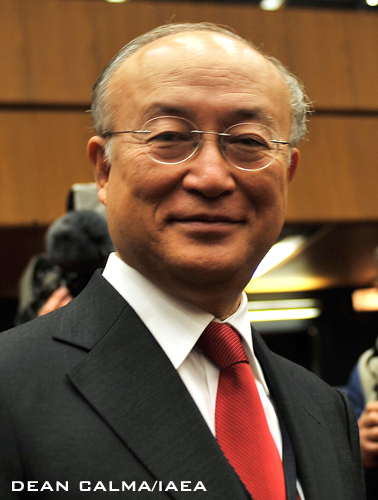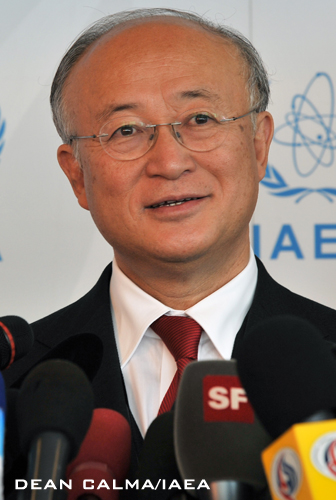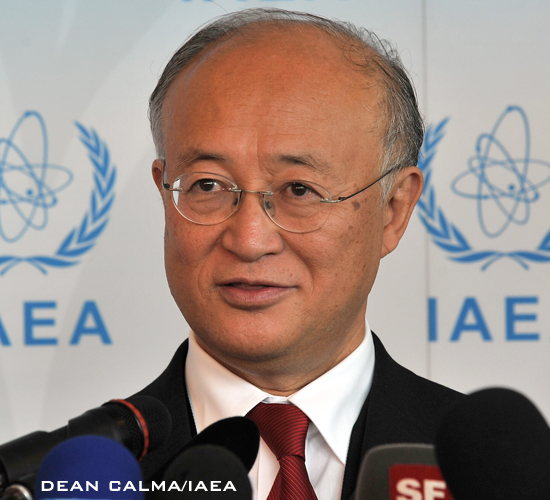Official Stats
- Official Title: Director General
- Government: Nuclear Watchdog Agency
- Years Left in Office:
- Political Classification:
- Education: Law degree
- Age: 78 (born May 9, 1947)
Yukiya Amano Facts and Information
The Rundown
First off, what is the IAEA you ask? The IAEA is an intergovernmental organization based in Vienna. It was established as an autonomous organization on July 29, 1957. Even though it was established independently of the United Nations, it still has to report to the United Nations General Assembly and the Security Council! Not very independent if you ask me! It is the global center for cooperation in nuclear applications, energy, science and technology. The agency was established to promote safe and secure nuclear technologies and prevent the proliferation of nuclear weapons. The agency does this by working with its Member States and partners. It’s main goal is peace peace peace! No more nuclear bombings!
Mr. Amano was born on May 9, 1947 in Kanagawa Prefecture, Japan, is married and speaks English, French and Japanese. A graduate of the Tokyo University Faculty of Law, Mr. Amano joined the Japanese Foreign Ministry in April 1972. From 1973-1974, he studied at the University of Franche-Comte and from 1971-1975 he studied at the University of Nice, France. Mr. Amano has extensive experience in disarmament, nonproliferation and nuclear energy policy and has been involved in the negotiation of major international instruments such as the NPT extension, the CTBT, the BTWC verification protocol, the amendment of the CCW and the ICOC. He represented Japan as a Governmental Expert on the UN Panel on Missiles in April 2001 and in the UN Expert Group on Disarmament and Nonproliferation Education in July 2001. You can obviously see that Amano is pretty damn smart and has a lot of experience in what he is doing!
Previous to being the head of the IAEA, Amano was the chair of the Agency’s Board of Governors from 2005-2006. During this time, the IAEA and its director general Mohamed ElBaradei received the Nobel Peace Prize, and Amano has the pleasure of representing the IAEA as the chairman at the Nobel Prize award ceremony! How cool is that? He was Japan’s Resident Representative to the Agency from 2005 until he was elected as Direct General in 2009. He has also held senior positions in the Japanese Foreign Ministry such as the Director of the Science Division, Director of the Nuclear Energy Division, and Deputy Director General for Arms Control and Scientific Affairs. While in these positions, he was involved in international negotiations such as the Nuclear Non-Proliferation Treaty extension, the Biological Weapons Convention verification protocol, and numerous other amendments and treaties. He was appointed Director-General for Arms Control and Scientific Affairs in August 2002 and Director-General of the Disarmament, Nonproliferation and Science Department in August 2004.
In September of 2008, it was officially announced by the Japanese government that Yukiya Amano had been nominated for the position of the Director General of the IAEA. On July 2, 2009, the Board of Governors elected Amano for the position in the sixth round of voting resulting in the his defeating of his primary rival, Abdul Samad Minty, the South African representative. He officially took on the roll in December of 2009. Amano succeeded Mohamed ElBaradei, who served in the position for 12 years. Yukiya Amano will be the fifth leader in the organization’s history.
When beginning his new position, Amano planned to stick with the IAEA’s mandate of inspections to prevent proliferation in nations such as Iran and North Korea that have a lot of tension in them. He was also very supportive of President Obama’s position on Iran and even praised him for the work he did with diplomacy in the country. He has also said that he did not want to be as outspoken as his predecessor ElBaradei, who clashed with the Bush Administration over its claims that Saddam Hussein possessed weapons of mass destruction in the run-up to the U.S. invasion of Iraq.
With no surprise, accusations arose! What would the world be without little conspiracies and arguments between countries? In November 2010, British newspaper The Guardian reported on a U.S. diplomatic cable originating a year earlier in Vienna a meeting between Amano and an American ambassador. The author of the cable summarized a statement by Amano in which the latter offered that he “was solidly in the U.S. court on every key strategic decision, from high-level personnel appointments to the handling of Iran’s alleged nuclear weapons program.” In March 2012, Amano was accused by several former senior IAEA officials of pro-western bias, over-reliance on unverified intelligence and of sidelining sceptics. Ah! The beauty of politics and trying to better one’s country!
As should be clear by the work he is doing, Amano is very much opposed to the spread of nuclear arms. A reason for this, he says, is because he is from a country that experienced Hiroshima and Nagasaki. He is also very concerned with the safety and security of nuclear power. He believes they should be the primary responsibility of each sovereign state. In the past two decades, he thinks there has been a very significant improvement in the efficiency and safety performance of the nuclear industry. He says that we should never be complacent with nuclear science and technology, and I fully agree!
After the Japanese earthquake and tsunami nuclear emergency on March 11, 2011, also known as the Fukushima I nuclear accidents, Amano held a meeting with the Prime Minister of Tokyo. Yukiya Amano said the Japanese nuclear disaster “caused deep public anxiety throughout the world and damaged confidence in nuclear power”. Amano wanted to be very involved in the emergency and said he would dispatch a team within days to monitor radiation near the damaged plant. On 28 March 2011, at a special briefing on the Fukushima nuclear accidents held for IAEA Member States, Amano announced that a high-level IAEA Conference on Nuclear Safety should take place in Vienna.
As of today, Amano is working on a delicate mission, and a very important one at that! If all goes well, it could be determined if Iran is seeking atomic arms while strengthening the Islamic Republic’s negotiating hand. Amano wants Iran to agree to terms that will allow the agency to resume probing on whether Tehran is secretly working on nuclear arms or not. Other countries involved in this mission are the United States, Russia, China, Britain, France, and Germany.
Quotes By Amano:
“We need to carefully maintain a channel of dialogue. Iran is an important country. You must deal with it with respect and dignity.”
— Amano in a February interview praising President Obama’s willingness to sit down with Iranian officials (Reuters, Feb. 11, 2009)
“The IAEA’s basic function is not political negotiation but implementing already agreed safeguards. Remarks by the director have political implications which, if made without properly assessing these implications, can be very dangerous.”
— Indicating that he will maintain a less politically involved profile than his predecessor (Reuters, Feb. 11, 2009)
“[I am] resolute in opposing the spread of nuclear arms because I am from a country that experienced Hiroshima and Nagasaki.”
— BBC (July 2, 2009)
Photos
Plaidcasts Involving this Leader
- Nuke Group Review: part 2 Apr 17, 2010
Video Interviews
Translate This Page



